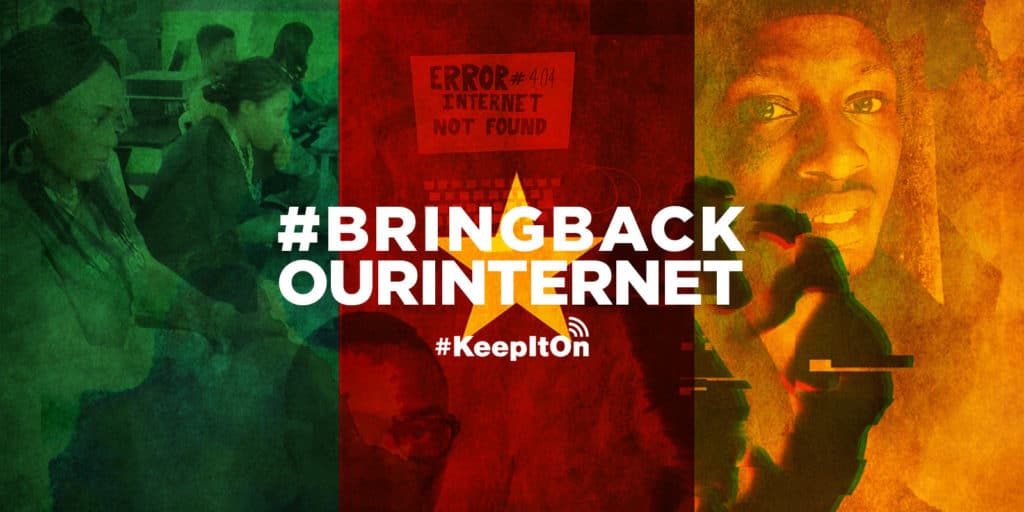Update, 3/12/2018: Victory! U.N. High Commissioner Zeid Ra’ad Al Hussein has now provided an oral update on the situation in Cameroon to the 37th session of the Human Rights Council, March 7, 2018, stating, “I urge the Government to make every effort to de-escalate the conflict in the Anglophone regions, and to allow unimpeded access to human rights monitors so that accurate information on the situation can inform constructive engagement on the way forward.”
Access Now thanks the High Commissioner for clearly calling on Cameroon to allow U.N. monitors and noting the need for accurate information on the conflict and its impacts.
—–
Access Now has joined the University of Southern California Gould School of Law’s International Human Rights Clinic (USC IHRC), together with legal counsel, Foley Hoag LLP, in urging the United Nations High Commissioner on Human Rights, Zeid Ra’ad Al Hussein, to address recent human rights violations committed by the Republic of Cameroon against the country’s Anglophone population.
In a letter, Access Now and USC IHRC seek increased efforts by the U.N. to prevent future human rights violations against Anglophone Cameroonians in Cameroon and those seeking asylum in Nigeria, as well as to ensure that those responsible for prior violations are held accountable for their unlawful conduct. The letter further calls on the Government of Cameroon to respect Anglophone Cameroonians’ rights to assembly and peaceful protest, freedom of expression, and access to information through any media.
“As your Office is aware, over the past year and a half, the Government of Cameroon has brutally cracked down on any perceived political dissidents,” the letter states. “English-speaking civilians from the Anglophone Cameroonian regions have been particularly targeted because of their opposition to the Government’s discriminatory policies aimed at economic suppression and forced assimilation of this minority group. What in 2016 ‘began as a simple request for English to be used in the courtrooms and public schools,’ has since escalated into a major crisis.”
The letter emphasizes several serious violations against Anglophone Cameroonians, including torture, inhuman treatment, and threats to freedom of expression. In January 2018, Nigeria extradited many arrested Anglophone Cameroonian political leaders to Cameroon, violating both Nigerian and international law, the letter states, adding that the situation has become “further internationalized” with Chad deploying its military in Cameroon at the request of the Cameroonian government.
“The warning signs are clear, and world leaders should not sit idly while Cameroon continues its campaign of censorship and repression,” said Peter Micek, General Counsel of Access Now. “Cameroon’s leaders have repeatedly shut down the internet in a blatant attempt to silence and weaken the English-speaking minority, so far with impunity. Civil society expects global diplomats and lawmakers, from Cameroon’s neighboring countries, the United Nations, and beyond, to take a stand. We must act urgently to prevent further attacks on Anglophone communities, which displace people and violate their human rights.”
“These widespread and rapidly escalating human rights violations against Anglophone Cameroonians must be stopped once and for all,” said Professor Hannah Garry, founding Director of USC Gould School of Law’s International Human Rights Clinic. “We hope that in our appealing to UN leaders about what’s taking place in these countries, action will be taken to ensure these individuals can live their lives free from oppression and strife.”
Along with the letter, Access Now and USC IHRC are working to schedule meetings with the offices of several U.S. congresspersons to address these human rights issues.
The USC IHRC handles pro bono advocacy projects to confront some of the most pressing human rights concerns. Access Now is a non-governmental organization that works to defend the digital rights of users at risk around the world through policy and advocacy interventions, direct technological support, grants, and the RightsCon event series.
Contacts:
Peter Micek, General Counsel, Access Now
Email: [email protected]
Professor Hannah Garry, director of USC International Human Rights Clinic, USC Gould School of Law
Email: [email protected]
